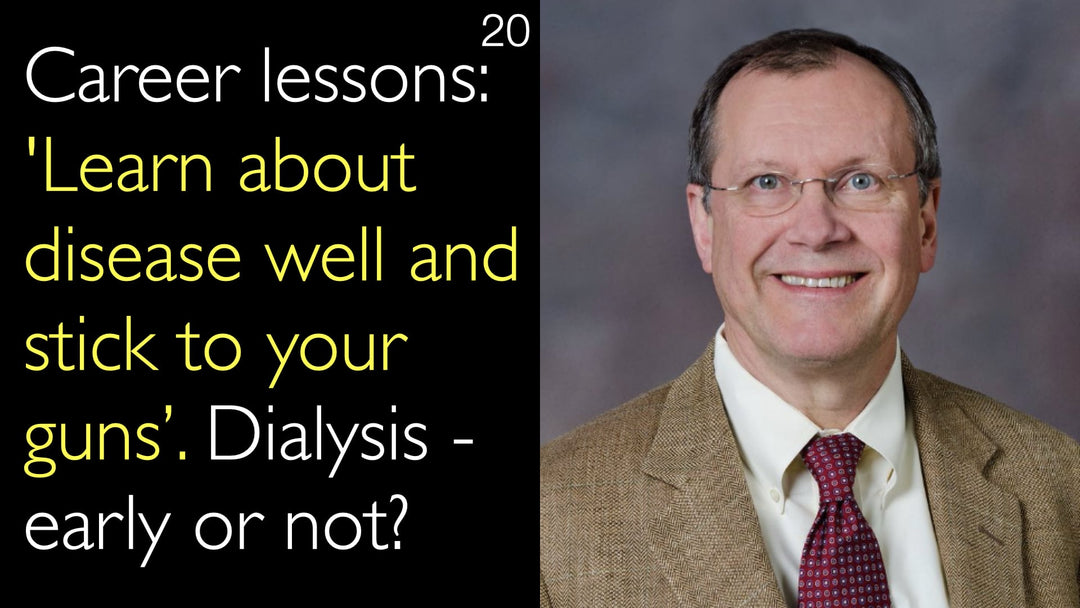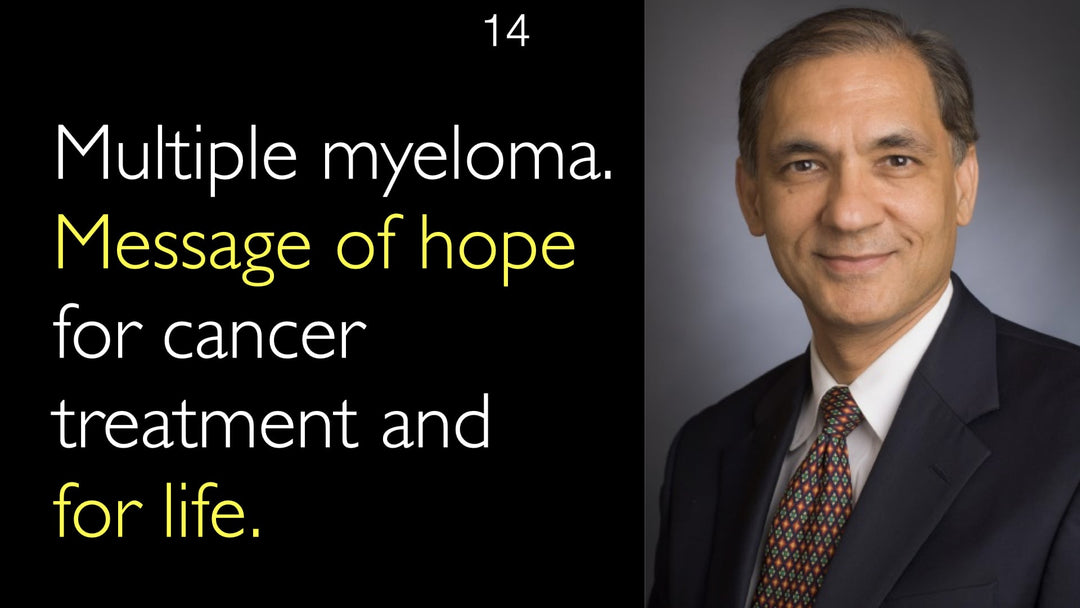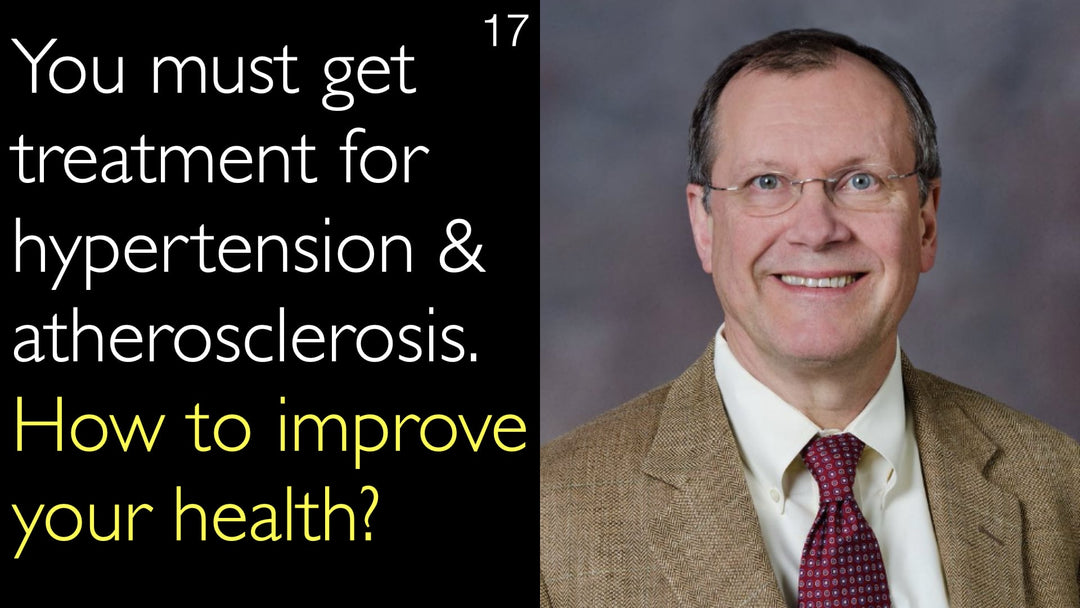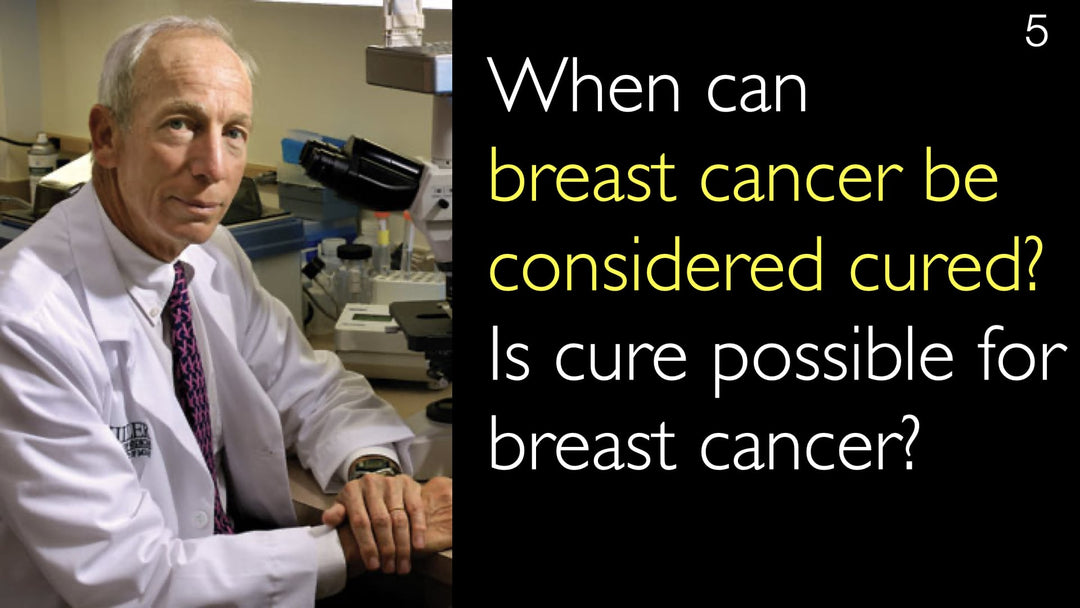Leading expert in nephrology and hypertension, Dr. David Ellison, MD, explains the critical importance of developing a deep understanding of disease physiology. He shares a powerful career lesson on the value of sticking to clinical convictions, using the history of dialysis initiation timing as a key example. Dr. David Ellison, MD, discusses how he maintained his approach against prevailing trends, which was later validated by a major randomized controlled trial. He also reflects on the humility required to change practice when new evidence proves an approach wrong.
Optimal Dialysis Initiation Timing: When to Start Treatment for Kidney Failure
Jump To Section
- Dialysis Initiation Philosophy
- Symptomatic vs Asymptomatic Patients
- Observational Studies Bias
- IDEAL Trial Validation
- Clinical Convictions & Humility
- Full Transcript
Dialysis Initiation Philosophy
Dr. David Ellison, MD, developed his approach to chronic dialysis initiation early in his nephrology career. He believed patients should start dialysis only when they become symptomatic from their kidney failure. This philosophy centered on ensuring treatment benefits clearly outweighed the significant burdens for patients.
Dr. Ellison emphasized that dialysis carries substantial downsides, requiring patients to visit a treatment center three times weekly. He told Dr. Anton Titov, MD that physicians must be convinced dialysis will genuinely benefit the patient before initiating this life-altering therapy.
Symptomatic vs Asymptomatic Patients
The clinical approach differs dramatically between symptomatic and asymptomatic kidney failure patients. Dr. David Ellison, MD, explained that symptomatic patients often feel grateful after starting dialysis because treatment improves their quality of life. These patients experience relief from uremic symptoms, volume overload, and electrolyte abnormalities.
In contrast, asymptomatic patients who feel fine may struggle with dialysis adherence. Dr. Ellison noted they typically won't appreciate being forced into a demanding treatment regimen that disrupts their life. This fundamental difference in patient experience shaped his conservative approach to dialysis initiation timing.
Observational Studies and Lead-Time Bias
Dr. David Ellison, MD, described how observational studies temporarily shifted nephrology practice toward earlier dialysis initiation. These studies suggested patients starting dialysis earlier had better outcomes, creating pressure to change practice patterns. However, Dr. Ellison identified critical methodological flaws in this research.
The apparent benefit resulted from lead-time bias - healthier patients with better kidney function were being started on dialysis earlier. As Dr. Ellison explained to Dr. Anton Titov, MD, if you put a person with normal kidney function on dialysis, they'll do well because they're healthy, not because dialysis benefits them. This statistical distortion misled the field for years.
IDEAL Trial Validation of Conservative Approach
The Australian IDEAL trial finally provided definitive evidence about dialysis initiation timing. This randomized controlled trial compared early versus late start dialysis strategies in chronic kidney disease patients. The results confirmed what Dr. David Ellison, MD, had believed for years based on clinical experience.
Patients who started dialysis only when they became symptomatic or reached very low glomerular filtration rates (GFR) did just as well as those starting earlier. The IDEAL trial validated the conservative approach that Dr. Ellison had maintained despite pressure to change his practice. This demonstrates the importance of evidence-based medicine in resolving clinical controversies.
Balancing Clinical Convictions with Humility
Dr. David Ellison, MD, emphasizes the importance of developing deep knowledge and clinical convictions while remaining open to new evidence. He maintained his dialysis initiation approach for years despite contrary trends, which ultimately proved correct. However, Dr. Ellison also demonstrates professional humility by acknowledging when he was wrong.
He shared with Dr. Anton Titov, MD an example where randomized trials showed his approach to acute decompensated heart failure was incorrect. When patients had rising creatinine levels with heart failure, Dr. Ellison would stop diuretics. Evidence eventually proved this wrong, and he changed his practice accordingly. This balance between conviction and flexibility defines excellent clinical practice.
Full Transcript
Dr. Anton Titov, MD: Professor Ellison, in conclusion, is there anything in your personal interest and philosophy and life experience that you'd like to share?
Dr. David Ellison, MD: Yeah, I guess I could share lots of stuff. And certainly, as many people say, I wish I knew when I was 25 what I know now. But I will share one thing, which is I think in clinical medicine and in science, it's really important to get a deep understanding of disease physiology, and to develop an approach to patients and to treating diseases. But then to really stick to your guns.
I have a number of examples of ideas I formed early in my career about how to treat patients. For example, this is not about diuretics, but when to start patients with chronic kidney disease, when to put them on dialysis, when to start them for their chronic dialysis treatment. And this is a field that's gone through ups and downs over the years.
Again, this is a field that was really, I think, harmed by a lot of observational studies. And so, what I learned early in my career, and what I believed was that you generally should start patients on chronic dialysis treatment only when they become symptomatic, or when they have signs of volume overload, or electrolyte abnormalities.
We were talking about the fact that most treatments we have benefits and they have risks. But having a patient go on chronic dialysis, to have to come to a dialysis unit three times a week and endure dialysis, you really have to be convinced that that's going to benefit the patient, because there are a lot of downsides to that kind of treatment.
And so, if a patient's feeling bad from their chronic kidney disease, and you put them on dialysis, they'll often be grateful to you because you've helped them feel better and live longer and have a more active life. But if they're feeling fine, and you make them go to the dialysis unit three times a week, they're not going to be so happy with the dialysis that they probably won't be happy with good adherence to the treatment regimen.
So early on, I learned that approach and I really believed that approach. And that was my experience; it worked pretty well. But then a number of studies came out that suggested that we should put patients on dialysis earlier and earlier. It actually happened to correspond to the fact that if you put patients on dialysis, actually, for a nephrologist, it's usually easier for you to take care of them, and you get better reimbursement as well.
So, there are a lot of adverse reasons to do that. But the study suggested the patients going on dialysis earlier did better. And of course, the problem with that is there was a so-called lead-time bias. If I pick a person with normal kidney function and put them on dialysis, they'll do great because they're healthy.
And what's happening is you're taking patients and you're doing the dialysis for six months, a year, two years before they really need dialysis. And therefore, they're doing well but they didn't need dialysis anyway. So, we finally found out from the so-called IDEAL trial from Australia, in which they randomized patients to early start or late start of dialysis.
And what they found out was waiting until patients got symptomatic, or till they had a really low GFR, patients did just as well as patients who are early start dialysis. And that really confirmed what some of us had been thinking for many, many years. But it was really hard to argue against people while these studies were coming out.
But I stuck to my guns. And I was pretty vocal about the fact that I didn't think we needed to put people on dialysis before they really needed it. And I think in the end, it turned out to be correct. So, I think it's good to understand, to develop a deep knowledge, and then develop some convictions about what the right approach to patient care is.
And stick with those, even if people push back. On the other hand, I've certainly not always been right. And the counterexample is I used to always say if I had a patient with a rising creatinine, and with acute decompensated heart failure, oh, stop the diuretics. And it really was the randomized controlled trials there that showed me I was doing the wrong thing.
And I needed to change my approach to acute decompensated heart failure.
Dr. Anton Titov, MD: Professor Ellison, thank you very much. This is a very insightful life lesson. And thank you for sharing them. I very much thank you for this absolutely superb discussion on a very, very complex nature of heart disease and kidney disease.
And it just illustrates again and again how the body and mind functions all together and therefore, physicians must treat body and mind as a whole and not just a particular organ or particular symptom or particular abnormality on a test. Thank you very much for this discussion! I really enjoyed and delighted to talk with you and glad people are interested in this topic!







